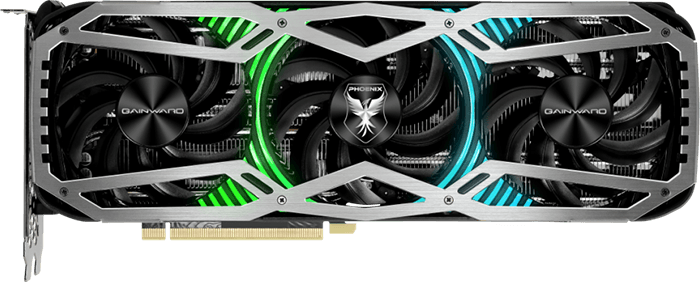
Gainward GeForce RTX 3090 Phoenix
Benchmark and Specs
Last updated:
Benchmark and Specs
All technical data and various benchmarks of the Gainward GeForce RTX 3090 Phoenix are listed on this page. The graphics card is based on the GA102-300-A1 (Ampere) graphics chip, which is manufactured with a structure width of 8 nm. The Gainward GeForce RTX 3090 Phoenix can operate up to 4 screens with a maximum resolution of up to 7680x4320 become.
GPUThe Gainward GeForce RTX 3090 Phoenix has 82 execution units with 10496 shaders. This gives the graphics card a theoretical FP32 computing power of 35.58 TFLOPS. |
|
| Based on: | NVIDIA GeForce RTX 3090 |
| GPU Chip: | GA102-300-A1 (Ampere) |
| Streaming Multiprocessors: | 82 |
| Shader: | 10496 |
| Render Output Units: | 112 |
| Texture Units: | 328 |
| Raytracing Cores: | 82 |
MemoryThe Gainward GeForce RTX 3090 Phoenix is equipped with 24 GB graphics memory of the type GDDR6X. The memory clock of the graphics card is 1.219 GHz and the speed is 19.5 Gbps. |
|
| Memory Size: | 24 GB |
| Memory Type: | GDDR6X |
| Memory Clock: | 1.219 GHz |
| Memory Speed: | 19.5 Gbps |
| Memory bandwidth: | 936 GB/s |
| Memory Interface: | 384 bit |
Clock SpeedsThe base frequency of this graphics card is 1.395 GHz and the manufacturer specifies the maximum turbo clock as 1.695 GHz. If supported (see below), the performance can be further increased by overclocking. |
|
| Base Clock: | 1.395 GHz |
| Boost Clock: | 1.695 GHz |
| Avg (Game) Clock: | |
| Overclocking: | Yes |
Thermal DesignThe Gainward GeForce RTX 3090 Phoenix is powered by 2 x 8-Pin connectors. The TDP (Thermal Design Power) of the graphics card is 350 W. |
|
| TDP: | 350 W |
| TDP (up): | -- |
| Tjunction max: | 93 °C |
| PCIe-Power: | 2 x 8-Pin |
Cooler & FansGraphics processor and graphics memory of the Gainward GeForce RTX 3090 Phoenix are cooled by a Air cooling. |
|
| Fan-Type: | Axial |
| Fan 1: | 3 x 90 mm |
| Fan 2: | -- |
| Cooler-Type: | Air cooling |
| Noise (Idle): | 0 dB / Silent |
| Noise (Load): | -- |
ConnectivityUp to 4 monitors can be operated with the Gainward GeForce RTX 3090 Phoenix. |
|
| Max. Displays: | 4 |
| HDCP-Version: | 2.3 |
| HDMI Ports: | 1x HDMI v2.1 |
| DP Ports: | 3x DP v1.4a |
| DVI Ports: | -- |
| VGA Ports: | -- |
| USB-C Ports: | -- |
FeaturesetWith the Gainward GeForce RTX 3090 Phoenix it is possible to operate a screen with a resolution of up to 7680x4320 pixels. Furthermore, the DirectX standard version 12_2 (Ultimate) is supported. |
|
| Max. resolution: | 7680x4320 |
| DirectX: | 12_2 (Ultimate) |
| Raytracing: | Yes |
| DLSS / FSR: | Yes |
| LED: | Non addressable LED |
Supported Video CodecsThis area lists the video codecs that the Gainward GeForce RTX 3090 Phoenix can decode or encode in hardware in order to minimize the processor load, which leads to lower power consumption. |
|
| h264: | Decode / Encode |
| h265 / HEVC: | Decode / Encode |
| VP8: | Decode |
| VP9: | Decode |
| AV1: | Decode |
DimensionsThe Gainward GeForce RTX 3090 Phoenix needs the space of 3 PCIe-Slots in a case. It is 294 mm long, 112 mm high and -- wide. |
|
| Length: | 294 mm |
| Height: | 112 mm |
| Width: | -- |
| Width (Slots): | 3 PCIe-Slots |
| Weight: | -- |
Additional dataThe Gainward GeForce RTX 3090 Phoenix was released in Q3/2020 at a price of 1,559 $. The graphics card manufactured in 8 nm is connected to the system via PCIe 4.0 x 16 lanes. |
|
| GPU Interface: | PCIe 4.0 x 16 |
| Release date: | Q3/2020 |
| Launch Price: | 1,559 $ |
| Structure size: | 8 nm |
| Part-no: | NED3090019SB-132BX |
| Documents: | data sheet |
Rate this graphics card
Benchmark results
3DMark Benchmark (DirectX, Raytracing)
3DMark is a benchmark program that determines the performance of certain components of a computer and then reports the performance as a numerical value.
Time Spy Extreme Graphics score

|
Gainward GeForce RTX 3090 Phoenix
24 GB GDDR6X |
||

|
NVIDIA GeForce RTX 3090
Average of gpu group |
||
Port Royal (Raytracing)

|
Gainward GeForce RTX 3090 Phoenix
24 GB GDDR6X |
||

|
NVIDIA GeForce RTX 3090
Average of gpu group |
||
Speed Way Graphics Score (Raytracing)

|
Gainward GeForce RTX 3090 Phoenix
24 GB GDDR6X |
||

|
NVIDIA GeForce RTX 3090
Average of gpu group |
||
Cyberpunk 2077
Cyberpunk 2077 was developed by CD Projekt Red and is based on the development studio's own REDengine 4. Ray tracing is switched off in our benchmarks.
3840x2160 (2160p)

|
Gainward GeForce RTX 3090 Phoenix
24 GB GDDR6X |
||

|
NVIDIA GeForce RTX 3090
Average of gpu group |
||
2560x1440 (1440p)

|
Gainward GeForce RTX 3090 Phoenix
24 GB GDDR6X |
||

|
NVIDIA GeForce RTX 3090
Average of gpu group |
||
1920x1080 (1080p)

|
Gainward GeForce RTX 3090 Phoenix
24 GB GDDR6X |
||

|
NVIDIA GeForce RTX 3090
Average of gpu group |
||
The Last of Us Part 1
The Last of Us Part One is a game released by Sony in June 2013 exclusively for the Playstation and released for the PC in early 2023. The benchmark values here were determined at high details.
3840x2160 (2160p)

|
Gainward GeForce RTX 3090 Phoenix
24 GB GDDR6X |
||

|
NVIDIA GeForce RTX 3090
Average of gpu group |
||
2560x1440 (1440p)

|
Gainward GeForce RTX 3090 Phoenix
24 GB GDDR6X |
||

|
NVIDIA GeForce RTX 3090
Average of gpu group |
||
1920x1080 (1080p)

|
Gainward GeForce RTX 3090 Phoenix
24 GB GDDR6X |
||

|
NVIDIA GeForce RTX 3090
Average of gpu group |
||
Battlefield 5
Battlefield 5 is a visually stunning game that is ideal as a graphics card benchmark. We test the game with maximum details on Windows 10.
3840x2160 (2160p)

|
Gainward GeForce RTX 3090 Phoenix
24 GB GDDR6X |
||

|
NVIDIA GeForce RTX 3090
Average of gpu group |
||
2560x1440 (1440p)

|
Gainward GeForce RTX 3090 Phoenix
24 GB GDDR6X |
||

|
NVIDIA GeForce RTX 3090
Average of gpu group |
||
1920x1080 (1080p)

|
Gainward GeForce RTX 3090 Phoenix
24 GB GDDR6X |
||

|
NVIDIA GeForce RTX 3090
Average of gpu group |
||
Geekbench 6 (OpenCL, Vulkan, Metal)
Geekbench 6 is a cross-platform benchmark for main processors, which also carries out 3 different graphics benchmarks and outputs them in the form of a numerical value.
Geekbench 6 - OpenCL

|
Gainward GeForce RTX 3090 Phoenix
24 GB GDDR6X |
||

|
NVIDIA GeForce RTX 3090
Average of gpu group |
||
Geekbench 6 - Vulkan

|
Gainward GeForce RTX 3090 Phoenix
24 GB GDDR6X |
||

|
NVIDIA GeForce RTX 3090
Average of gpu group |
||
FP32 Performance (Single-precision TFLOPS)
The theoretical computing power of the graphics card with single precision (32 bit) in TFLOPS indicates how many trillion FP32 floating point operations the graphics card (GPU) can perform per second.
FP32 (TFLOPS)

|
Gainward GeForce RTX 3090 Phoenix
24 GB GDDR6X |
||
More benchmarks
In order to determine the performance of a graphics card, so-called "benchmarks" are carried out. The benchmark software carries out special calculations to determine the performance of a graphics card. We use so-called theoretical or synthetic benchmarks (e.g. 3D Mark) as well as real game benchmarks. To ensure real comparability of the results, we pay attention to the correct execution of the benchmarks as well as the condition of the graphics card and the system.We use the following benchmarks to measure the performance of a graphics card:

3DMark Benchmark
5,129 entries
5,129 entries

Cyberpunk 2077
2,924 entries
2,924 entries

The Last of Us Part 1
2,040 entries
2,040 entries

GTA 5 Benchmark
4,605 entries
4,605 entries

Shadow of the Tomb Raider
5,130 entries
5,130 entries

Battlefield 5
4,492 entries
4,492 entries

Geekbench 6
5,132 entries
5,132 entries

Crypto-Mining Ethereum Hashrate
3,504 entries
3,504 entries

Crypto-Mining Ergo Hashrate
3,735 entries
3,735 entries

Crypto-Mining Ravencoin Hashrate
3,662 entries
3,662 entries

Crypto-Mining Vertcoin Hashrate
2,458 entries
2,458 entries

FP32 Performance
5,503 entries
5,503 entries
Popular comparisons










